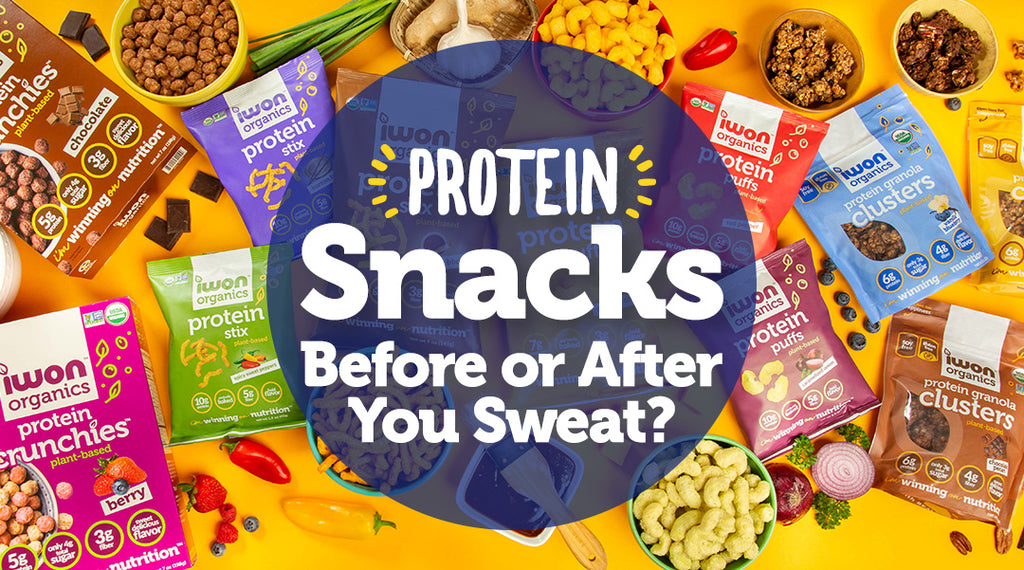
Protein Snacks Before or After You Sweat?
Questions around protein are in constant circulation in the health and fitness industry. How much protein should we eat? Is it best to have protein before or after a workout? Do we still get the benefit of protein outside of the anabolic window? How can I meet my protein goals without eating so many animal products? Are all nine essential amino acids necessary in order for my protein to build muscles and nourish my body? As a leader in vegetarian, plant based protein snacks, we thought it might be time to shed a little light on protein myths and truths, so we can all make the best choices to feed our bodies what they need, when they need it.

There is a reason all of this seems so confusing. It’s not that the experts can’t agree. It’s that they are all experts in their own fields, and each bit of research and set of case studies shows different results. Why? Because they are all conducted with a different set of circumstances. That means the answers to all of those questions becomes, it depends. Before you get frustrated, consider the many reasons people eat what they eat and work out in so many different schedules and formats.
Choices in the world of health and fitness are made based on the desired goal or outcome. If you want to bulk muscle, you lift weights. If you want to increase lung capacity, you focus on high intensity cardio. If you want to lose weight, you choose aerobic exercise with moderate weight training. If you just want to be healthy, you could be mixing it all up and avoiding boredom or hitting a physical plateau. Your body might just enjoy movement, so dance, pilates, or yoga could be your jam. Perhaps it’s about competition and team work, so sports and athletics are most likely your path. It’s the same with food. We choose what we eat based on the results we’re trying to create. This is why protein is so confusing.
If you’re focused on building muscle, you will want to eat more protein than someone who is working out for basic fitness. For those trying to lose weight, protein is a great choice as the dominant macronutrient in your diet because it is more satiating, meaning you will feel fuller longer, and it tends to be leaner than most carbs, allowing you to eat more. If you want a specific number to reach, the Recommended Daily Allowance (RDA) suggests 0.8 grams of protein per kilogram of body weight. That would be 0.36 grams per pound. The issue here is their recommendations are for basic body functions to avoid illness or death from protein deficiency. This is not the recommendation by any fitness professional for weight control or body composition.
While different goals require different levels of protein, it’s safe to say double that is a good place to start, 0.72 grams per pound. Check with a nutritionist, coach, or other health professional if you are concerned you may not be getting enough or consuming too much for your particular fitness needs.
For those focused on protein in their diets, protein snacks and shakes will be natural additions to daily meal plans. This can quickly become animal heavy between meat and dairy as most shakes are whey or casein based. It’s important to consider your body’s response to this and work to get more plant-based proteins in your food. The old theory that plants don’t provide all essential amino acids has been debunked as that little tale was circulated due to most plants not have all nine aminos in the same plant, but for anyone who eats a variety of plant foods, i.e. rice and beans, you will get all the amino acids your body needs. Add in some pea protein puffs and vegan snacks to help round out your protein profile.
Now let’s talk timing.
To optimize your results and empower your muscles, do you need to consume your protein before or after you workout? The best answer is both! Research now says that for optimal fitness and training, eating your target protein amount should be divided up throughout the day in four to five portions or every three to five hours. This can be during breakfast, lunch, and dinner and can also be supplemented with shakes and healthy high protein snacks. Just keep in mind your total calories to stay in a caloric deficit or surplus depending on your goals.

Protein benefits the body in different ways depending on when you eat it, and each of those benefits are important for anyone who is working to build or maintain optimal strength and health. When you add protein to your breakfast, you are literally breaking the fast from the night before. Protein will help you curb hunger and reduce cravings throughout the day.
As for the question, before or after your sweat session? Your body needs protein before a workout, within one to four hours depending on the source, in order to have amino acids available for muscle protein synthesis, the body’s process for building muscle. Your body needs protein 30 minutes to two hours after a workout to aid in muscle recovery and rebuilding what you broke down when working out. So the answer is literally both!
As long as you are consuming high-quality, protein based snacks, any time of day is a good time to indulge!
